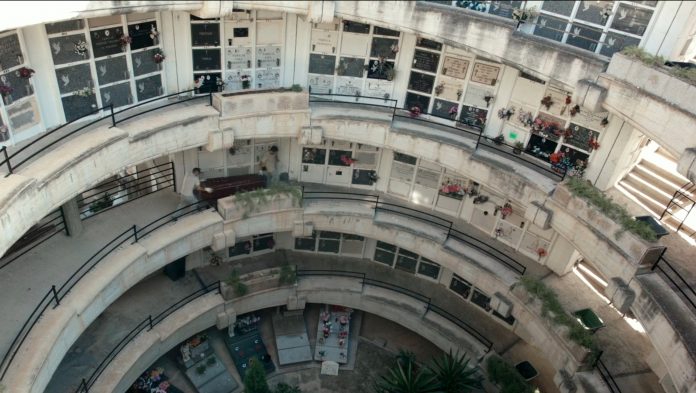(THIS ARTICLE IS MACHINE TRANSLATED by Google from Norwegian)
City of the Dead shows everyday life in the cemetery Palma Cement, which is located in Palma de Mallorca. We follow life there for a whole year. It may not sound festive, but the film is an observational documentary with both humor and depth that offers more than what the laundry note promises.
We get an insight into the many tasks of the burial and cemetery staff, and the interactions with the relatives who come to bury their loved ones, visit their loved ones or say goodbye. City of the Dead is a hot film that breaks down certain prejudices and fears that pertain to the very last stop of a person's life: cemetery.
To be human
The camera captures – both nuanced and empathetic – what it means to work day in and day out closely on the fact most of us need to think about: the recognition that we are all dying.
In the meeting with José (the salesman from the funeral home), the funeral agents David and Sergio, the gardeners Jaume and Mohammed, José Luis from the crematorium, the guard Gabi and the cleaning assistant Manuela, we realize that reality and death are surprisingly little frightening and a natural part of being human.
Sometimes the days are filled with drama, often there are humorous episodes, and daily routines and interactions often take place with or around the deceased. Observing the usual tasks of the various employees makes us realize how necessary, inevitable and meaningful their work really is.
It is really mostly about dealing with the living, people in their most vulnerable moments, where the masks fall and the only thing left is love and grief.
Working with the deceased is a team effort. It involves days filled with routine tasks, quiet moments where things are not big, but also some days that are busier than others. On Halloween, the cemetery staff must handle a large number of visitors; then relatives come with flowers to decorate the graves of their loved ones.
The fact that someone is running out of time involves both administrative work and a number of practical tasks that need to be solved, as well as a large number of decisions that need to be made. The cemetery can just as easily be compared to other business operations; it offers everything from clothes and music to the grave site itself – and everything costs money. José, the sales agent, talks to every single family with the same low-pitched voice. He has a catalog for everything. The questions can be very many and often give rise to the realities and practical choices that many relatives experience as a tumultuous and dramatic period. Should the deceased be cremated or buried? Should it be a Christ figure on the coffin itself? If there is going to be music at the funeral, should it be performed by one or more songs?

Director Miguel Eek
The last party
The funeral home's staff is simply doing event planning. They help to organize the last significant event in a person's life, which involves many aspects that need to be discussed, but they also show a gentleness and consideration for the affected families. Seeing José perform his duties paints a bigger picture that reveals that saying goodbye to someone is both unique and personal to the individual, while something we all experience sooner or later – a universal and inevitable experience.
The human in all interactions, the humor ("I don't want to be cremated, I'm afraid of fire," says one employee), the routines and the dialogue give an impression of empathetic staff with a surprising calm. After all, those who have death as a profession have seen it all, and one might think that employees in funeral homes and cemeteries would become numb, distanced or blasphemed. But this is not the case here. The workers have a healthy and dark sense of humor and are seemingly endlessly patient: An important part of the job is listening to the stories they are told, and in raw, close moments that is exactly what the relatives need – they will tell about memories and stories, use words without filters, they want to be heard, comforted and reassured.

Director Miguel Eek
Angels
Grabbing stories from relatives that they see angels ("When my husband died, I saw an angel by his bed," tells an elderly woman) or "feel" that the deceased is present is something that comes with the job. Also comforting a woman who visits her grandfather's grave while she is fighting for life is part of the job description.
Working with the dead is really mostly about dealing with the living, people in their most vulnerable moments, where the masks fall and the only thing left is love and sorrow.
The film leaves an insight that saying goodbye is an experience we humans have in common. The film depicts a "community in society", where life and death are linked. The cemetery is a miniature community where all kinds of people come and go, dead and alive. The portrait of this place is richer than the sum of all the people lying there – people who loved and have been loved – and who are managed by the workers of the place while it buzzes with life from the city outside the walls of the cemetery, where life continues undisturbed.
Translated by Iril Kolle


